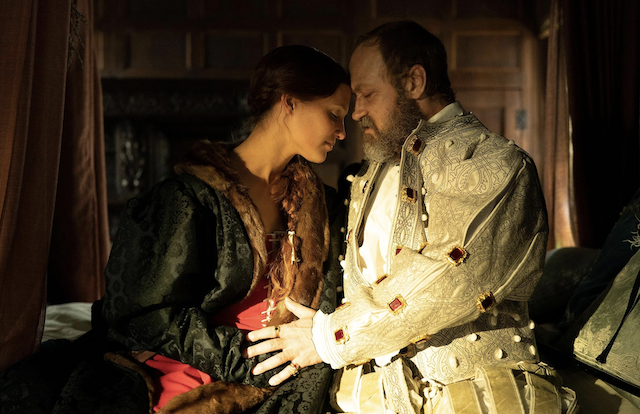
Photo by Larry Horricks/Larry Horricks – © Brouhaha Entertainment Limited 2023
Firebrand : In blood-soaked Tudor England, twice married, accomplished, and educated Catherine Parr (Alicia Vikander), reluctantly agrees to become the sixth wife of the tyrannical King Henry VIII (Jude Law). Her consent to marry him carries great personal risk, given that her predecessors are either vanquished, beheaded, or dead. When Henry appoints her as Regent, the nation’s ruler during his absence when he departs to fight overseas, he lays a dangerous path for her.
Henry’s courtiers, suspecting she’s sympathetic to radical Protestant beliefs that have taken root in the kingdom and are a threat to their power, scheme against her and cast doubts upon her fidelity to the increasingly ailing and paranoid King. Once Henry returns to England, his courtiers convince him to turn his fury on the nation’s radicals, including Katherine’s childhood friend Anne Askew, who becomes one of the scores of people convicted of treason and burned at the stake. Horrified and privately grieving, Katherine finds herself under ever-increasing scrutiny and suspicion. Knowing that even a whisper of scandal might lead to her downfall, Katherine must unleash her own scheme to fight for survival.
Director : Karim Aïnouz
Producer : Carolyn Marks Blackwood, Gabrielle Tana
Screenwriter : Jessica Ashworth, Henrietta Ashworth, Elizabeth Fremantle, Jessica Ashworth, Henrietta Ashworth, Rosanne Flynn
Distributor : Roadside Attractions / Vertical
Production Co : Brouhaha Entertainment
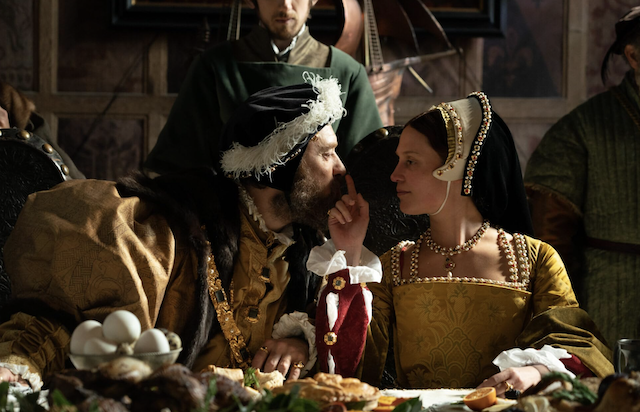
Q: Henry VIII was one of the outsized figures in history. Your performance is really extraordinary bringing different angles to him than we’ve ever seen. What were the keys to Henry that helped you get a handle on him during his difficult final days, his grip on England, and in his relationship to Catherine Parr?
Jude Law: The area I really understood was that it’s not about understanding him. The thing that I hooked into the most was the pain he was in. It’s about finding sympathy or some kind of empathy for the person you’re playing, especially when you know their behavior is despicable. Somehow, physically giving a plausibility, a sense of non-judgment and understanding about what agony he was in having those legs.
On top of that was the frustration and sense of self disappointment [he had] in himself. A Lot of the work I did was looking back and understanding who he had been to himself and to the world. He was seen as such a man of potential, a very modern man. He wrote music. He had hits around Europe with his songs. He was a great sportsman. He was seen as this great potential God, like a kind of Prince.
Of course, he descended into this laughable pit after most of Europe was laughing at him because of what had happened with his wives. And, to hit 50 and be physically on the downside, rotting literally from the toes up was an area I felt was a good place to start.
Q: We see him playing music here. The holiday classic “Greensleeves” was written by him, of course. Yes. In 1817 was about to be 18 and he died at 55.
Jude Law: Another interesting angle is that he didn’t know he was going to be king. His father was a usurper. who stole the crown off his cousin. He had an older brother, Arthur, who was meant to be king and was meant to marry his then first wife. At 16, he was expecting Arthur to be king but Arthur died suddenly, so Henry was going to be king.
The way I read it, he was having a very enjoyable youthful existence, singing, dancing, and suddenly was taken and put in a castle, told to prepare to be the leader of the faith. Also to me, the delusion, the brainwashing of telling a kid that young that you are second only to God, that you are God’s secretary — what that does to someone is madness. It’s a madness of power.
Q: Also, there’s this idea that he was so much bigger than his own psychology; he’s bigger than all of this — there’s a lot of layers — he is asking his followers to love him [unconditionally].
Jude law: I suppose we were trying to unpeel that a little bit. What I was interested in was that when you get down to it, if you’re someone facing the end, and you’ve set this mantle up where you are supported by not only God, but the power of the throne, but that in the end you see your own weaknesses.
I just can’t believe how deluded he was, that he didn’t know as he approached death that ultimately he was going to be judged and then ultimately that he had failed as a man. Even if he was like, “I’m still the king God loves me. I can do no wrong.” It must have been in the pit of his stomach the sense of what a disaster I am. I don’t even know.
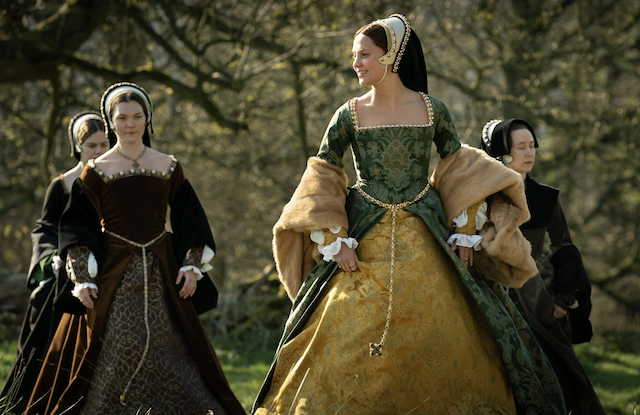
Photo by Larry Horricks/Larry Horricks – © Brouhaha Entertainment Limited 2023
Q: The film presents Henry, almost like the shark from “Jaws.” People are talking about him, you hear him in the hallway and you see him from behind, and then, there he is. There’s always the sense of foreboding. It’s phenomenal.
Jude Law: We talked a lot, Karim and I, about that opening shot. I thought, “There’s such a build up to, oh, he’s coming, the king’s here — get rid of the food, or make more food, or whatever. when you see him, he’s just a lonely, lost little guy. Dealing with his own mortal wounds, and trying to blow a tune on a little whistle, that leads into another area that we have a lot of fun with, which was very hard.
Karim and I talked a lot about power, and projecting power. When you play someone with great power, it’s not how you play it. Of course, if you play someone with power and you come out and go, “I’m powerful!” That’s not someone who’s got power. People who have power are usually very quiet. It’s how everyone around them reacts. If everyone drops to their knees when someone walks in the room, or everyone is terrified, you all know why are they all reacting like that to this guy. a lot of what we created was based on the people around me. Karim was brilliant at creating an environment in the room. He would give me a really big build up before I came on set. The king’s coming.
Q: With so much of this obviously from voluminous research, what was your research process like in preparing for the film?
Jude law: zlots of reading. I didn’t really know an awful lot. I knew what I would call a sketch, like an outline of him. I obviously knew about the many wives and probably as much as most of us in this room knew. Unfortunately, there’s an awful lot written. So once I started the deep dive, you start reading and there’s so many books. It’s an intriguing rabbit hole to go down.
But the big lesson to me was that the more I read, the more I realized that history has certain pillars of truth and then everything else in between is interpretation. I read book after book and it was like, “Oh, that’s the same fact. And that’s the same fact.” And everything else was really the writer or the historians’ analysis or a romantic interpretation of those facts. it led me to, and us, to feel a bit like we have the right to interpret. There was a lot of that, and then again, a lot of that was then laid into a physical embodiment — a sense of trying to make him feel authentic and physically real.
Q: Was there anything you wanted to hold back in some way? Obviously, he’s got that temper, but we don’t see it for probably 45 minutes or so into the movie until it comes up. It can be volcanic or lightning fast. And it can be really visceral. Was there anything that you wanted to hold back on in order to have it have more impact later on in the film or in other scenes?
Jude law: The violence. It felt important to use it like a weapon. I remember thinking early on, I really wanted him to be like a silverback gorilla with no legs. He couldn’t move, but if you could come within his reach, he’d crush you. Karim, the director, had this image of Charles Lawton with a chicken bone, eating. Then, we met this amazing historian who told us that there’s evidence that he apparently ate — I don’t know how historians work this out — but there’s evidence that he ate in small portions. In fact, he wasn’t a guzzler, but he ate constantly, so they would cut his food up, test it for poison, which is why there’s that scene when he tests Catherine — it was so poignant.
The food that came in had to be tested because they were paranoid that the Portuguese, the Spanish, the French, the Italians, everyone, was trying to poison each other. He was eating little bits, which I thought was important. I didn’t want him to be seen guzzling food. I wanted you to also understand that he had an attraction, and that sounds odd, but I wanted you to remember that he had been weirdly attractive in his past. Quite a fun guy. Now he sat in this castle of shit, basically. We see that in the party scene, too. There’s definitely that sense that he could be fun when he sings. That was one of his hits. I love that.
Karim was very funny. Karim’s Brazilian. When I first met him, he said, let’s learn together. when we found this song, he was like, “Oh, like Justin Bieber. He had a hit.” it is a bit like the 50 year old Justin Bieber going, you may remember this little tune and singing his hit.
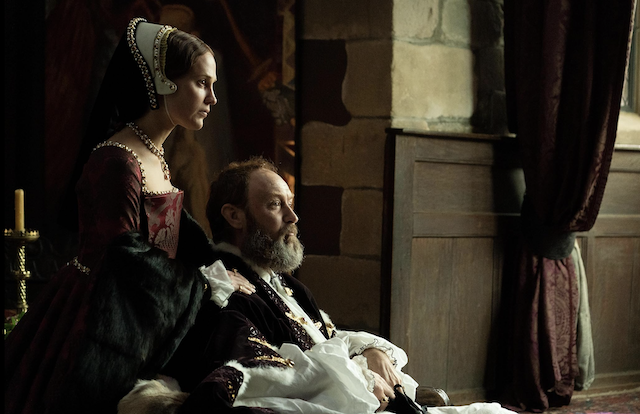
Photo by Larry Horricks/Larry Horricks – © Brouhaha Entertainment Limited 2023
Q: The duet that you have, of course, with Alicia Vikander is amazing. With Alicia, how did you both approach this tumultuous marriage and do that duet?
Jude Law: It’s always so interesting when you release a film or through the process of memory and recounting the experience, because when you’re in it, it’s very especially on a low budget indie movie, I was fortunate. I got involved very early on, and then, as most indie films go through, we lost the money, and then we got the money. I had months where I was just reading and waiting for it to happen.
Then Alicia came on board. We actually had someone else in that role initially. With about three months to go, Alicia came on board and I knew her. Her approach was very much in keeping with the energy that she portrays as Catherine, and the energy she has as a woman and as an actress, who is incredibly steady and calm. She was on her own path. Then when we started rehearsing, she’s an intelligent actress, a brilliant partner, fearless and funny.
There was nowhere we couldn’t go. It became very clear that we had to get into very dark waters in certain scenes. To me, I was always being led by her. It had to be comfortable for her and she had to say what her parameters were. I think she saw it as a very important strength of the part she was playing of Catherine that she wanted it to be clearly painful. I don’t know if that was comfortable, but she was constantly pushing, saying we should make this harsher.
We should make it harder So her triumph is all the more extraordinary. I think her performance is very bold because she really doesn’t reveal much because of course she couldn’t, she plays the coolest hand of poker ever. This woman couldn’t really reveal what her long game was until she had just a little glimmer of opportunity. That was similar in a way to Alicia’s application as an actress, as a partner, we talked about this when we showed this film in Cannes.
We both sat there and felt guilty because people were talking about how dark it was. We looked at each other and we were like, “Yeah, but we really had so much fun.” We really laughed a lot. I think when you’re creating scenes like that, you have to laugh. You have to also feel a sense of triumph if you’ve managed to push the edges and come home successfully or safely as in Catherine Parr’s story, in terms of what anyone thinks about those six wives of Henry VIII.
Q: While obviously there are dark places, her enlightenment and moving forward after him is a story of progress. We see that in this film, and in her performance.
Jude Law: It’s very interesting. I read some of the pieces on this film that have come out so far, and people are quick to say “Yeah, but are they interpreting this in the wrong way? Where’s the evidence?” The evidence, like I said, has been written by the winners. The evidence has been written by the king. What’s extraordinary is that if you look between [the lines] and recognize what Catherine achieved under him.
Publishing her own work. She was the first woman to publish her written words under her own name — an immense achievement — and that’s 500 years ago. By the way, if you look between 500 years ago and who is in between up to Bronte or Wharton, that’s a 300 year gap.
Then what she did was bring his family and create a home in which Queen Mary and Queen Elizabeth were nurtured. There’s something in there that lends, I think, a sense of her overview and strength. That was very much at the heart or the hope of us as a team to triumph and at least shed light on this woman who has been forgotten as a nanny, “Oh, she looked after him. She was a good maid. She was a good wife.” We know that there were two written death warrants for her, one written up by him but he fell asleep and apparently woke up and forgot about it and took her on a picnic. Another, where she was imprisoned and was then interrogated but somehow got out. You think, what must that have been like when you know that two of the previous women in that situation had been beheaded. I have great respect for that.
Q: Talk about how the costumes were very important, with costume designer Michael O’Connor and hair and makeup designer Jenny Shircore and their team were vital collaborators. This is not a costume drama, but is a domestic drama that takes place 500 years ago so it has to reflect that. Talk about the way that costumes, hair and makeup helps you in so many ways.
Jude Law: The process was really interesting. First of all, costume designer Michael O’Connor made a really bold and brilliant decision early on. He hired a museum in London which was actually set up to instruct and teach students of fashion how to make clothes in that period. We hired them to make the clothes, inside and out. Normally, with costumes they look correct on the outside but if you open them, they’re like velcro. Ours were hand stitched with all the lacing and we didn’t have a button or a piece of velcro.
They took I was to put on and there were layers and layers, but it meant that we could really live in them. Karim was very insistent that rather than the costumes being us, he didn’t want it to feel like I’m wearing this grand costume. When we get home and if we’re wearing a dress or a tie or whatever, we pull it off and we’re like, “Oh God, it’s hot. I’ve got to breathe.” He would forever be like, “Rip your costumes off, throw them on the floor. He was always making us sort of wear it, but not wearing it, which really helped this sense of domesticity and ownership. They looked beautiful and grand, but they were discarded and trodden on.
He always wanted us to take it off and throw it on the floor. With Jenny Shircore, the hair and makeup, again, was very similar. She and I met months before. I don’t know why, but I had this strong sense that I didn’t want to wear prosthetics. I didn’t want to put a colored Henry mask on. I was already growing the beard and we knew that there’s this sort of silhouette of Henry that we all know. It’s this big square head with this bald paint. So we shaved my head back to about here, let the beard grow, and as soon as I shaped the beard, it was weird how close we got. It was like, “Oh, that’s Henry.” Then it was a case of just a bit of shading, plucking eyebrows and beautiful details that she did. On the whole, she was, “It’s like less is more,” and it was very freeing.
Q: That’s the good part of it. What about the story, either in reading the script or talking with Karim, really resonated with you, too, thematically and narratively?
Jude Law: When I read it, it was simply an opportunity to play this huge character that I never thought would come my way. But then in meeting Karim, he talked about it on such a human level. I joked earlier that he didn’t know much or care much for the history, but that became a real bang. We had historians advising us. We knew we had to go there, but initially, the sense of it being a domestic piece about a man and a woman in this really fraught timeless, and sadly, kind of drama, resonated with me. It feels like I’ll play Henry VIII, but play him as a husband in a domestic drama, a kitchen sink drama. That was the hook.
Q: What do you hope audiences take away from the film?
Jude Law: For me, the experience of working with Karim, and revealing in the detail of history, some of those idiosyncrasies and peculiarities that are so alien to us, and yet somehow feeling like they’re very tangible. it’s not that far away. I don’t want this to be some kind of political rally but there’s something about Henry VIII where you look at this guy who is holding onto power through bullying, threats and manipulations. I see a lot of those guys on TV across the world. We have to learn that these fuckers don’t deserve to be there.
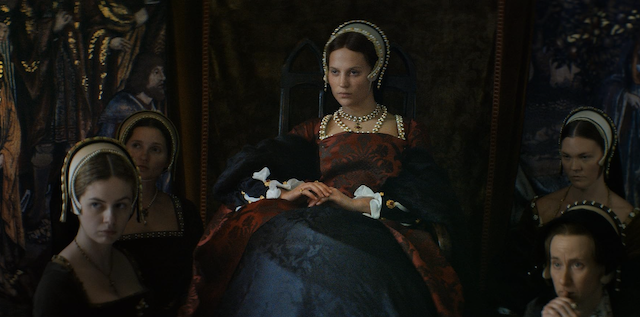
Photo by Larry Horricks/Larry Horricks – © Brouhaha Entertainment Limited 2023
If you like the article, share your thoughts below!
Check out more of Nobuhiro’s articles.
Here’s the trailer of the film.

